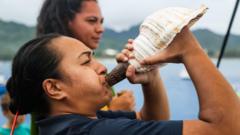Plans to exploit the Cook Islands' rich minerals lying on the ocean floor have provoked significant backlash from environmentalists and local communities worried about the potential damage to their fragile ecosystem. Jean Mason, curator of the Cook Islands Library and Museum, humorously describes the seabed nodules—usually mistaken for mere rocks—as crucial to the nation's potential prosperity. These mineral-rich polymetallic nodules, filled with cobalt, nickel, and manganese, are gaining traction as vital resources for modern technologies powering electric vehicles and smartphones.
In a nation already grappling with the realities of climate change, rising sea levels threaten both the economy and the way of life for its residents, who heavily rely on fishing and tourism. Prime Minister Mark Brown views deep-sea mining as a transformative initiative for the islands, keen to reshape their economic landscape. However, critics express concerns that such an endeavor comes with grave risks. They highlight the need for comprehensive research into the environmental impact of extracting these formations from one of the planet's last untouched frontiers.
Historically, mining nodules were regarded as less significant. Now, as global demand for these metals surges, the Cook Islands is positioning itself to capitalize on this resource. Nevertheless, environmental groups, such as the Te Ipukarea Society, are calling for an immediate halt to mining plans, arguing the need for independent research to fully understand potential damages to marine life and ecosystems before any licenses are issued.
Activists have taken to the waters, raising awareness of the risks associated with deep-sea mining. Alanah Matamaru Smith from Te Ipukarea emphasizes the urgent need for more time to evaluate the long-term implications of these activities. Yet, the government remains steadfast in pursuing exploration licenses to three mining companies, aiming for economic recovery after the decline in tourism due to the COVID-19 pandemic.
The Cook Islands, with its vast Exclusive Economic Zone covering nearly 2 million square kilometers, is eager to leverage its title as a "large ocean state." While some believe seabed mining will furnish financial benefits comparable to those of Norway's sovereign wealth fund, opponents stress the desire for more sustainable solutions. Activists like June Hosking plead for an open dialogue about the hazards of deep-sea mining, asserting the necessity of informed discussions when it comes to the long-term preservation of their home and culture.
With factions divided and concerns mounting, the future of deep-sea mining in the Cook Islands is fraught with uncertainty as the nation weighs its economic aspirations against the imperative to protect its natural heritage.





















